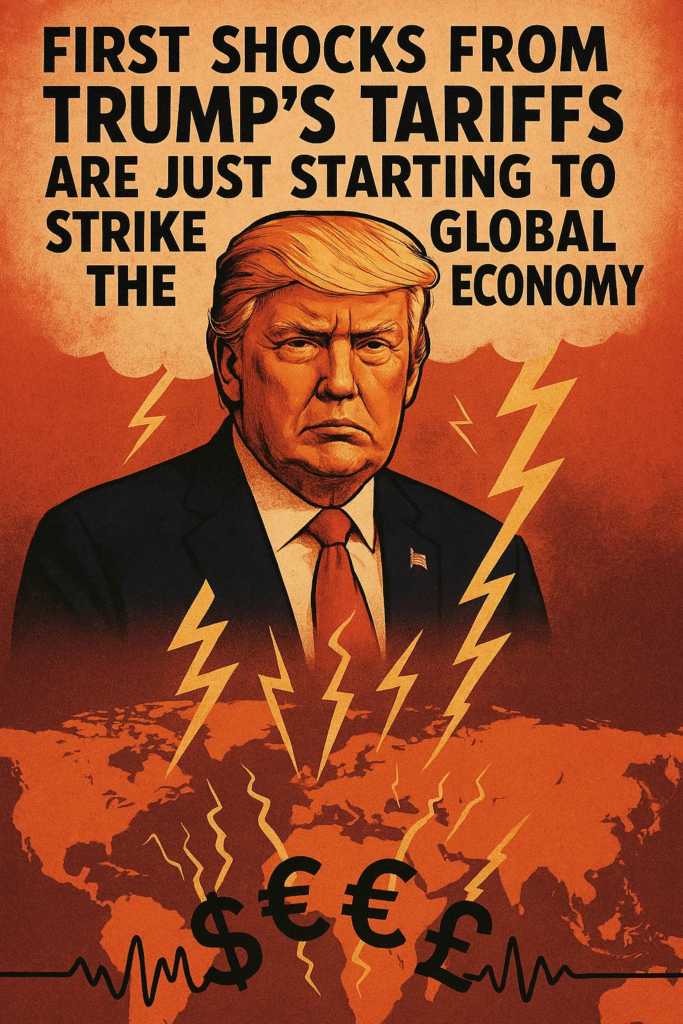A little over three weeks since US president Donald Trump effectively declared a trade war with the entire world, the latest economic forecasts and studies will suggest the first impact.
Just a few blocks away to The White House, the International Monetary Fund is expected to reduce its forecast for economic growth, in its new forecasts that were released on Tuesday.
The next date, purchasing manager indexes from Japan to Europe to the US will give the first comprehensive glimpse of the manufacturing and services activities following the Trump’s global tariffscurrently in a partial halt and enacted the 2nd of April. Surveys of business activity from the major economies are also scheduled for the schedule.
The entire picture is intended to provide finance ministers as well as central bankers in Washington the chance to present preliminary assessments of the damage caused by Trump’s plan to reform the world trade system.
“Our new growth projections will include notable markdowns, but not recession,” IMF managing director Kristalina Georgieva said on Thursday. “We may also witness marksups to inflation forecasts for certain countries. We’ll warn against prolonged excessive uncertainty can increase the risk of stress in the financial markets.”

The clouds that engulf the global economy aren’t expected to disappear for a long time. Federal Reserve Chair Jerome Powell declared in a statement on Wednesday, that the US central bank is “well positioned to wait for greater clarity” before making any changes to its monetary policy, as European Central Bank chief Christine Lagarde could not say if the that uncertainty is at its peak.
Meanwhile, Georgieva is hoping the next few days, which include a gathering of the Group of 20 finance chiefs will cool the heat in the global trade relationship.
“We need a more resilient world economy, not a drift to division,” she added. These Washington events “provide a vital forum for dialogue at a vital time.”
In the US investors will keep an eye out for any further decline in consumer sentiment or inflation expectations as they hear that the University of Michigan issues revised data for April on Friday. Tariffs, as well as the danger they bring to the economy as well as inflation are on the minds of respondents to surveys in recent months.
On Wednesday the Federal Reserve’s Beige Book will offer anecdotes of regional economic conditions, and offer the details of how government policies and uncertainty are the main factors influencing the decisions of business.

On the same day on the same day, the government is likely to announce a slight increase in the number of new homes sold in March. Since mortgage rates have been stagnant at 6.5 per cent since October the builders have been experimenting with incentives to draw buyers off the back of. Data on home sales will be released on Thursday.
Further to the north, Canadian election campaign is in its final week and polls indicate that the Prime Minister Mark Carney’s Liberals are five points clear — making them within the reach of a majority government in an uneasy trade war with the US.
One of the key architects behind Canada’s response to US tariffs the Trade negotiator Steve Verheul, is set to address a conference in Toronto. Retail sales data for February and a preliminary estimate for March will show the extent to which Canadian consumers have cut back on spending for the third consecutive month despite the uncertainty surrounding trade.
In Asia the week begins off by China reporting prime rates for loans on Monday. Economists are predicting that the outcome will be steady. Recent data showed growth beating forecasts.
Also, on Monday Indonesia releases trade statistics for the month of March. This will be a good indicator of the state of the country’s export sector prior to the tariffs of Trump’s kicking into effect. Meanwhile, the Philippines will likely to report another surplus in its balance of payments for March.
The next day, New Zealand publishes trade figures for March, while Taiwan as well as Hong Kong report employment data.
The next day the Indonesian central bank will keep rates at a minimum for the third consecutive meeting in an effort to help support the rupiah currency, which is one of the currencies that has performed poorly in Asia this year.
On the same day preliminary PMI data for April on Australia, Japan and India will give an early glimpse at the potential impact on industries of manufacturing and services due to the trade war led by the US.

